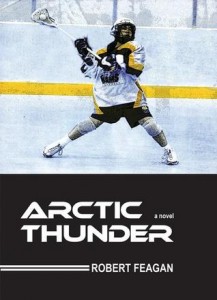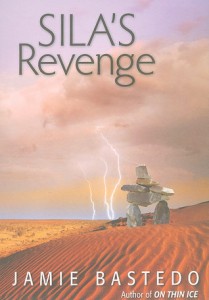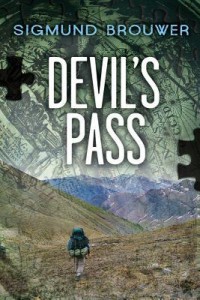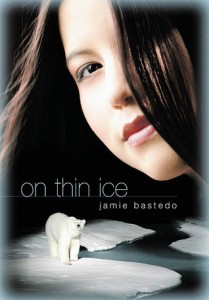Juggling Fire by Joanne Bell
 Summary: Sixteen year-old Rachel has unanswered questions in her life. Her father disappeared when she was only a child, and since his disappearance Rachel has been struggling to figure out whether he didn’t come back as he promised because he couldn’t or because he didn’t want to. Rachel prepares to go on a journey with her dog Brooks to find out for herself what really happened. Venturing to their family cabin in the Yukon where her father was last seen, she and Brooks set out across the Tundra, encountering challenges in the form of a bear, weather and dwindling resources. In a modern day fairy tale, Rachel is out to save her father’s reputation, but also herself in the process.
Summary: Sixteen year-old Rachel has unanswered questions in her life. Her father disappeared when she was only a child, and since his disappearance Rachel has been struggling to figure out whether he didn’t come back as he promised because he couldn’t or because he didn’t want to. Rachel prepares to go on a journey with her dog Brooks to find out for herself what really happened. Venturing to their family cabin in the Yukon where her father was last seen, she and Brooks set out across the Tundra, encountering challenges in the form of a bear, weather and dwindling resources. In a modern day fairy tale, Rachel is out to save her father’s reputation, but also herself in the process.
Number of Pages: 171
Age Range: 14-16
Review: In a book that is largely an introspective, isolated journey of one young woman and her dog, Juggling Fire by Joanne Bell explores the concept of fairy tales and how they look in real life.
Rachel’s story isn’t the easiest read. I had trouble with the thought of a mother letting her daughter venture out into the wilderness of the Yukon on her own. It’s also difficult to maintain a steady plot pace when the main character is the only one who can talk and is on her own for the majority of the book. In the grand scheme of things, not a lot happens plot-wise as a result.
But despite its challenges, Juggling Fire is a read I highly recommend. It’s a rare story of a sincerely independent young woman who proves she can take care of herself when it comes to surviving on the northern Tundra landscape. Rachel deals with a bear, she tends to her wounded dog, she scares off wolves when needed and she can fish. And this is all on top of performing the day-to-day aspects of surviving that come with building camp sites, fires and cooking nutritious, high-calorie foods to fuel the body. Rachel does all of this by herself, and proves she is entirely capable in handling any situation that comes her way. She is quite level-headed and resourceful.
The other aspect I love is that Rachel is unabashedly an introvert. Her father was too, and both of them find themselves most at home surrounded by the quietness and seclusion of nature. While near the end of the book Rachel is anticipating the arrival of her mother, it is more because of everything she has been through rather than loneliness. Rachel is a wonderful girl who is comfortable being alone with herself, otherwise she never would have made the trip in the first place.
The best part of Rachel’s story is her vivid inner-life. As a young girl she made a point of memorizing fairy tales, creatively re-writing them as she grew. I love how Bell connects fairy tales with Rachel’s experiences, because her journey contains a lot of the same elements found in such stories. Rachel is, in a way, a hero, because she ventures on a journey away from home to learn the truth of what happened to her father. What she learns has the power to change not only her life, but the lives of her mother and sister as well.
I don’t want to write much about Rachel’s father because I don’t want to wreck Bell’s suspense, but I loved how she developed him as an absent character who had a profound effect on the others’ lives. I truly didn’t know how his story was going to turn out, and it could have gone either way.
My favourite character was Brooks, the dog. Is there anything better than a journey with the companionship of a beloved dog?
I love this book as an empowering pick for early to mid female teen readers because it has a great message about what girls are capable of and how fairy tales are not all princesses being rescued by handsome princes. Happy to be reading it for the second time.
Memorable Quotes:
“Mom kept the tales alive because she repeated them to me. The trouble is that I’m not sure anymore what Mom made up and what really came from the book. And it’s started to matter. After Mom finished telling them, I started changing them around too. I couldn’t help it. The characters just got sick of being stuck in my head. They felt like victims with destinies out of control. They needed fresh starts and original plot twists.” – Rachel talking about how she was exposed to fairy tales from Juggling Fire by Joanne Bell, page 15
“Maybe I like fairy tales so much because danger is necessary for heroism. It’s not meaningless. When someone calls a story just a fairy tale, they usually mean two things. First, they mean that it’s not true. Second, they meant that it has a happy ending. Kind of strange, I think, because fairy tales are brutal. If they end happily, it’s only because the characters who remain alive just call the happy part the end. ‘Whoa!’ they shout, waving at the author. ‘Stop here while we’ve got a breather. Don’t go any farther down this trail.’
It’s not happy for the princes who’ve died honorably or their old mothers rattling about in palaces pining for them to gallop home. It’s not always so merry for the villagers who’ve been picked off by the open-jawed, flame-breathing dragons chasing them down the cobblestones. About the best the survivors can do is make tales of heroism to remember the slaughtered and keep their heads down and hope their own loved ones stay home.
That’s a key part of fairy tales: staying home, which is usually way safer than going on a quest. Everyone knows what old maps said at the borders to uncharted lands: ‘Therein lie dragons.'” – Rachel from Juggling Fire by Joanne Bell, page 21
“I ease up, not breathing. In this moment, I’m alive. Maybe I won’t be tomorrow, but I don’t care anymore. It’s a fine autumn day, sparkling with sun and fresh snow. Today while the Earth is turning, I get to be alive on it. And I’m glad.” – Rachel from Juggling Fire by Joanne Bell, page 165
Juggling Fire by Joanne Bell is published by Orca Books, (2009).
Arctic Thunder by Robert Feagan
 Summary: A prominent part of the St. Albert, Alberta champion Lacrosse team, Mike and his teammates are devastated when his RCMP dad Ben is transferred to Inuvit, Northwest Territories. Mike is even more upset when he finds out what his parents neglected to tell him – there is no Lacrosse team in Inuvit. The move turns out to be a positive change in Mike’s life though. He makes new friends, grows to love snowmobiling and is encouraged to learn more about his roots. His love of Lacrosse infects his new classmates, bonding them together when Mike’s dad sees them playing and starts an official team. Filled with talented and quick-learning players, Arctic Thunder has a real chance of winning an upcoming tournament against the team Mike used to play for.
Summary: A prominent part of the St. Albert, Alberta champion Lacrosse team, Mike and his teammates are devastated when his RCMP dad Ben is transferred to Inuvit, Northwest Territories. Mike is even more upset when he finds out what his parents neglected to tell him – there is no Lacrosse team in Inuvit. The move turns out to be a positive change in Mike’s life though. He makes new friends, grows to love snowmobiling and is encouraged to learn more about his roots. His love of Lacrosse infects his new classmates, bonding them together when Mike’s dad sees them playing and starts an official team. Filled with talented and quick-learning players, Arctic Thunder has a real chance of winning an upcoming tournament against the team Mike used to play for.
Number of Pages: 288
Age Range: 11-13
Review: Arctic Thunder by Robert Feagan is a bit young for my list, probably more suitable for pre-teen and reluctant early teen readers, but I truly enjoyed it.
Mike starts out with typical teen angst. He’s fourteen years old and his parents are moving him away from Alberta and everything that is familiar to live in a town located in the Arctic Circle. Or, as Mike’s friend puts it quite dramatically, the North Pole. It’s actually Inuvit, a northern town in the Northwest Territories.
If you are unfamiliar with the game of Lacrosse, Feagan’s book is for you. Lacrosse is Canada’s first official sport, developed by Aboriginals, but doesn’t get nearly the amount of attention hockey does. I loved learning about a sport I know very little about, especially since it turned out to be quite exciting and challenging. I liked how playing Lacrosse helped Mike make friends, and being on a team gave the teens something to take pride in.
I think what I enjoyed the most though was the picture Feagan develops for his reader about life in the extreme north. In Inuvit, people from the provinces are considered southerners, and trusting them is a challenge for some. Certain types of travel are only suitable during specific times of the year with the use of ice bridges in the winter, and the love of nature and solitude is widespread. Mike grows to love his new surroundings, especially once he realises he can live there and still play Lacrosse.
Donnie was my favourite character, and when he found a way to contribute to the Lacrosse team I was over the moon. Mike is a close second, because he’s a teen with a good head on his shoulders, not getting caught up in nonsense about befriending the geek and appreciating what Donnie has to offer as a friend. Feagan’s book is filled with great characters though, and the message of sports being a source of direction and accomplishment is a good one.
Though it was a lighter read for me, Arctic Thunder was engaging and informative. I was satisfied with the ending, and happy Mike and his friends were too.
Memorable Quotes:
“To Mike and all of the incredible athletes who have played our first national sport in the shadow of that other Canadian pastime. And to the memory of Victor Allen.” – Dedication from Arctic Thunder by Robert Feagan
“‘I think, Mike, you need to find yourself. You need to discover who you truly are.’
‘I don’t need to know about my culture. I need to figure out what’s going to happen to me right now.’
‘Mike, how do you know where you’re going if you don’t know where you came from?'” – Conversation between Victor and Mike from Arctic Thunder by Robert Feagan
Arctic Thunder by Robert Feagan is published by Dundurn Press, (2010).
Sila’s Revenge by Jamie Bastedo
 Summary: When Empire Oil comes to Ashley’s Northwest Territories community intending to drill, Ashley takes extreme action to prevent them from following through and wrecking the land. Afterwards Ashley’s drumming group is invited to play at Carnegie Hall in New York, and Empire Oil’s willingness to pay the cost of their travel puts Ashley on edge. Turns out Jack Masters, vice-president of Empire Oil, has a secret agenda to save the world from Climate Change in a radical manner that involves Ashley, and she and her friends find themselves on an unexpected journey that could mean the end of all life as they know it.
Summary: When Empire Oil comes to Ashley’s Northwest Territories community intending to drill, Ashley takes extreme action to prevent them from following through and wrecking the land. Afterwards Ashley’s drumming group is invited to play at Carnegie Hall in New York, and Empire Oil’s willingness to pay the cost of their travel puts Ashley on edge. Turns out Jack Masters, vice-president of Empire Oil, has a secret agenda to save the world from Climate Change in a radical manner that involves Ashley, and she and her friends find themselves on an unexpected journey that could mean the end of all life as they know it.
Number of Pages: 303
Age Range: 14-16
Review: In the sequel to On Thin Ice, Ashley is as staunch in her fight against Climate Change as ever. But now she’s fighting a big oil company in an effort to save her community and their way of life as much as she can despite the changing environment.
What follows is an unexpected adventure – Ashley’s drumming group is invited to play in New York where Ashley meets Jim Masters, an oil man himself who asks her to speak at the United Nations. An eccentric with his own personal grief issues, Masters is a puppet-master working everyone’s strings in a plan that is both admirable and vindictive. I had trouble keeping up at times with everything that happened, but in the end I could see the bigger picture which I appreciated.
My favourite character in Bastedo’s sequel is Sila, also known as Earth. She’s someone who should be respected and often isn’t, but I grew to enjoy how Bastedo paints her as vengeful and intentional in her actions. I don’t think she meant to kill Ashley’s dog, but I do question the randomness of the rain during the concert. Personalizing Earth’s actions gives her depth, and made me think twice about how Earth would be treated if she were a person instead of a planet. Bastedo makes a valid point with his story by opening up the conversation about how badly we treat the place where we live.
Sila’s Revenge is a stand alone, informative read about the subject of Climate Change, but since it’s more action based reading On Thin Ice first greatly helps develop Ashley as a character. I’d recommend it for fans of William Bell’s writing.
Memorable Quotes:
“The world had a beginning called the Mother of All Things.
Once you have found the Mother, you can know her children.
Having known the children, hold tightly to the Mother.
Your whole life will be preserved from peril.” – Lao Tzu, Tao Te Ching from Sila’s Revenge by Jamie Bastedo, page 3
“Cars, streets, skyscrapers vaporized in a soft green mist. Forests sprang out of the glow. They were broken by sprawling marshes, sparkling beaver ponds, and lush meadows dotted with grazing deer. A pair of bald eagles soared about a high rocky ridge that formed the the backbone of a living, breathing island.” – Ashley from Sila’s Revenge by Jamie Bastedo, page 47
“‘Many of us treat the Earth like a driverless spaceship drifting aimlessly around the sun. But the Earth is much more than this. Life is not just a passenger on this ship but an active participant, controlling the very conditions that sustain it. Life itself created its atmosphere and it is life that regulates it. The atmosphere, oceans, soils, plants, and animals are like the organs in our bodies. Call it a superorganism. Call it Gaia, after the Greek Earth goddess, or Terra, the Roman equivalent. Call it what you like. By whatever name, the Earth itself is alive. It is a planet sized being that knows how to take care of itself.'” – Doctor Livingstone from Sila’s Revenge by Jamie Bastedo, page 96
“‘You may think I’m crazy but I love the cold. I have to laugh when I walk these streets. It’s barely cold enough to snow and New Yorkers are bundled up like it’s forty below. For us, cold isn’t some pain to ruffle our hairdos. It’s not something to get over with like the flu. Cold is something we celebrate. It defines our land, our culture, who we are. This may sound funny but we can’t live without cold.
‘When cold comes each fall, when the snow comes and the ice starts forming on the sea, we’re happy. We know we can soon travel across the ice, hunt seals and caribou, and enjoy the land together.'” – Ashley speaking to the United Nations about Climate Change from Sila’s Revenge by Jamie Bastedo, page 100
Sila’s Revenge by Jamie Bastedo is published by Red Deer Press, (2010).
Devil’s Pass by Sigmund Brouwer
 Summary: It seems Webb is least affected by his grandfather David McLean’s death. Though he has fond memories of his grandfather, since his mother’s remarriage after the death of his father, Webb has been distancing himself from those he loves. With a step-father who physically and psychologically abuses him, taking everything and everyone important to him away, Webb has learned the only way to protect what he loves is to give it up on his own terms. Webb’s task from his grandfather upon his death is to go on a wild goose chase that takes him all the way to Norman Wells, Northwest Territories figuring out a mystery of his grandfather’s past.
Summary: It seems Webb is least affected by his grandfather David McLean’s death. Though he has fond memories of his grandfather, since his mother’s remarriage after the death of his father, Webb has been distancing himself from those he loves. With a step-father who physically and psychologically abuses him, taking everything and everyone important to him away, Webb has learned the only way to protect what he loves is to give it up on his own terms. Webb’s task from his grandfather upon his death is to go on a wild goose chase that takes him all the way to Norman Wells, Northwest Territories figuring out a mystery of his grandfather’s past.
Number of Pages: 237
Age Range: 14-16
Review: I learned the least about David McLean in Sigmund Brouwer’s addition to Seven the Series, but I loved Webb’s development. Webb is a tightly wound character who is always watching his step, something he has learned to do thanks to living with a highly abusive step-father. As a result he and his grandfather aren’t as close as McLean is to his other grandsons, added to the fact that the task McLean sent him to complete was not really about McLean himself, but his friends.
But McLean still maintains his wise-from-beyond-the-grave ways by having insight into what he determines is Webb’s true situation. While he couldn’t do anything about it in life, his task gives Webb the confidence and self-reflection to stop himself from becoming like Elliot, his step-father.
Despite all of the tragedy in his life, I enjoyed his connection with music as a way to ground himself. Brouwer even wrote a song called “Monsters” as Webb, but though it is supposed to be on the seventheseries.com I couldn’t find it. I have tweeted Brouwer to ask where I can find it.
Webb’s inner conflict interspersed with flashbacks to his childhood kept me reading. He seems to run into more than his fair share of bullies, but each time he faces his fears and is determined to stand up to them. He’s a character I’d like to read more about, which I will have the opportunity to do since Brouwer just came out with his Seven the Sequel and plans a third book as well.
Memorable Quotes:
“Then, without warning, his grandpa had held Webb’s shoulders, looked him in the eye and said, ‘Life is difficult more often that it is not. To live means to face difficulties. It’s what you learn from those difficulties that matters. And Webby, I want you to remember what a German philosopher named Friedrich Nietzsche once said: “That which does not kill us makes us stronger.”‘
It had been a quiet, serious moment. Then, like he did so often, his grandpa had given Webb a big grin, to relieve the seriousness of the moment.” – David McLean from Devil’s Pass by Sigmund Brouwer, page 40
“Webb realized he wasn’t afraid of Elliott hurting the soles of his feet. Webb had learned he could deal with pain, and Elliott had just said they were past anything physical. He was terrified, though, of losing what he loved. His dad had been taken unexpectedly and unfairly. Niblet was gone. That left only his mom.” – Webb from Devil’s Pass by Sigmund Brouwer, page 98
“George closed his eyes and Webb could see that he was making sure to tell him word for word what his grandfather wanted to pass along. ‘He who fights with monsters might take care lest he thereby become a monster. And if you gaze for long into an abyss, the abyss gazes also into you.'” – George giving Webb a message from his grandfather from Devil’s Pass by Sigmund Brouwer, page 149
Devil’s Pass by Sigmund Brouwer is published by Orca Books, (2012).
On Thin Ice by Jamie Bastedo
 Summary: After moving to a different town in the Northwest Territories to take care of her relatives, Ashley begins having intensely vivid dreams featuring a polar bear. But the strangest part is that the dreams start coming true. With climate change in the works Ashley’s small community is experiencing intense weather like never before, and the changing conditions of the ice have implications for a polar bear’s food supply. Problems arise when the bear comes too close to the community, causing fear and harm to residents. As her connection to the polar bear grows, Ashley learns about the changes happening in the environment and the history of her own family. Her dreams and experiences help her to embrace the special gifts she has, and face the changing future through offering what she has to give.
Summary: After moving to a different town in the Northwest Territories to take care of her relatives, Ashley begins having intensely vivid dreams featuring a polar bear. But the strangest part is that the dreams start coming true. With climate change in the works Ashley’s small community is experiencing intense weather like never before, and the changing conditions of the ice have implications for a polar bear’s food supply. Problems arise when the bear comes too close to the community, causing fear and harm to residents. As her connection to the polar bear grows, Ashley learns about the changes happening in the environment and the history of her own family. Her dreams and experiences help her to embrace the special gifts she has, and face the changing future through offering what she has to give.
Number of Pages: 348
Age Range: 13-15
Review: I know technically On Thin Ice by Jamie Bastedo is about climate change. Due to changing weather patterns, the ice up in the Northwest Territories is unknowable and the seals are scarce. The limited food supply and extreme weather conditions drive a polar bear close to a human settlement, endangering the people in it with her pursuit of nutrition.
I agree with Bastedo’s logic and how he gently nudges his reader into a greater understanding of what climate change actually means in real life as opposed to just being a catch phrase used by enterprising politicians. But what I enjoyed most about this book was that by the end, I truly wasn’t sure whether the polar bear had come close to the humans because of needing food, or because she had a personal connection with one of them. It was a mystical read, and though it didn’t seem to centre on Inuit beliefs, Bastedo does with his writing what Dr. Lyons does with his research, he works hard to combine Inuit knowledge with scientific knowledge.
In the process I grew to love Ashley as a character. She seems to have a destiny to fulfill with gifts passed down to her through her ancestors, and her connect to the polar bear shows up in vivid, future-predicting dreams. Her life is filled with colourful relatives and also an amazing artistic talent. Ashley’s perspective is refreshing and contains wondrous observations of her surroundings.
I also enjoyed reading from the polar bear’s perspective, although because I did I had trouble seeing the polar bear as dangerous. I empathized with her need for food and her reactions to the stimulus she was presented with. Logically I know polar bears and humans can’t co-exist in the same location because polar bears are dangerous, but I still had trouble imagining this particular polar bear as anything like the terrifying statue Ashley’s uncle had carved and Ashley had seen in her dream. Quite naive on my part.
But at the base of the story is something everyone can relate to: a basic need to learn to adapt to change as it comes. Bastedo explores this theme from different perspectives using his unique characters. Ashley’s mom takes a New Age perspective, her brother remains steadfastly resistant to all change and her aunt seems to absorb anything that comes her way with an air of already knowing what is going to happen.
I’m reading Sila’s Revenge, the sequel/stand alone novel by Bastedo the day after tomorrow, and I look forward to reading more of what he has to write about.
Memorable Quotes:
“I carried my grandfather to a rock that faced the sea.
And felt his calmness and joy
I looked at the sights that drew his eyes.
The land, the sky, the sea.
I heard a soft melody that grew with strength and pride.
From this song, his body moved and our world surged with life.
I listened to my grandfather and felt the song deep within my soul.
I stood next to my grandfather
And we moved to the ancient rhythms, the sound of the chant
And we embraced our youth..” – “Song of Spring,’ from Inuuqatigiit in On Thin Ice by Jamie Bastedo
“Uncle Jonah never let anyone touch his cup, let alone wash it. ‘That old thing probably hasn’t been cleaned in fifty years.’ Mom said. It seemed to glow on the outside. But inside it looked like a long forgotten toilet bowl. Dark, oily stains lined up in wavy lines like layers of silt trapped in permafrost. That was Uncle Jonah’s life to me: blurred, muddy streaks frozen deep out of sight.” – Ashley from On Thin Ice by Jamie Bastedo, page 34
“Really, Mom, it’s no big deal. Change is natural. It’s how you read the – what do you call them? – the signs. Those three king dudes didn’t run for the hills when they saw a little supernova two thousand years ago. They kind of . . . welcomed it, wouldn’t you say?’
‘But -‘
‘All change isn’t evil, Mom. It’s how you look at it. How you adapt.’ I plunked my potato pot in the sink and started filling it with water. ‘Like, you could look at this blizzard as the end of world or simply a great chance to cozy up with the neighbors.’ – Conversation between Ashley and her mother about adapting to change from On Thin Ice by Jamie Bastedo, page 151
“I love the freshness after a rain. What it does to those old lichens splattered on the rocks. Before a rain they’re dry and crunchy like corn flakes. After, they get all soft and swollen like seaweed. I love how the rain brings out their colors – black lichens turn a dark olice, while ones go all powdery green, orange ones glow like hot coals. After a good rain, I sometimes spend hours up in the hills with my pastels, sketching away, sitting on a rain-soaked rock, oblivious to my wet bum.” – Ashley from On Thin Ice by Jamie Bastedo, page 248
“I wasn’t really mad at her. And she wasn’t really mad at me. She was mad at life. Why do people take their personal stuff out on each other, especially when they’re supposedly best friends? It was all a smokescreen for inner battles. I knew all this in my head. Still, the tension wouldn’t blow away.” – Ashley from On Thin Ice by Jamie Bastedo, page 253
“My artist eye clicked one, creating an image that begged to be drawn: Uncle Jonah wore the tundra landscape like some grand flowing cape. From where I stood, it looked as if he was sinking into the ground, moving through it along some megical cleavage in the Earth’s skin that led straight to the underworld. And the Earth welcomed him – her cushiony plants and mosses, the sweet smelling peet, the clay soil, the thick chunks of shale, the thick lenses of ground ice, and, below that, the firestone.” – Ashley from On Thin Ice by Jamie Bastedo, page 309
On Thin Ice by Jamie Bastedo is published by Red Deer Press, (2006).
Spider’s Song by Anita Daher
 Summary: Hampered by family secrets, AJ lives in Yellowknife, Northwest Territories with her grandmother while her mother is away at achool getting her teaching degree. When AJ meets a busker named Ed who knows her family and about her mysterious father, she thinks she finally has a way to get her questions answered without having to deal with her grandmother’s stonewalling and her mother’s avoidance of the past. Ed ends up being everything AJ was looking for, a friend as well as a family connection, but all is not as it seems and the resulting drama will unlock secrets AJ never imagined, as well as revealing her true friends.
Summary: Hampered by family secrets, AJ lives in Yellowknife, Northwest Territories with her grandmother while her mother is away at achool getting her teaching degree. When AJ meets a busker named Ed who knows her family and about her mysterious father, she thinks she finally has a way to get her questions answered without having to deal with her grandmother’s stonewalling and her mother’s avoidance of the past. Ed ends up being everything AJ was looking for, a friend as well as a family connection, but all is not as it seems and the resulting drama will unlock secrets AJ never imagined, as well as revealing her true friends.
Number of Pages: 214
Age Range: 14-16
Review: Living in Yellowknife with her grandmother, AJ is having trouble adjusting to living without her mother. She’s having trouble making friends and her limited knowledge about her father continues as both her mother and grandmother refuse to talk about them.
Because of their commitment to hiding the truth, Spider’s Song by Anita Daher is a suspenseful thriller featuring personal pain. The pressure of the secrets builds in AJ, leading to her cutting herself in an attempt to release her internal anguish. When Ed comes to town, it seems as though AJ will finally get some answers, although Ed himself is stingy with sharing what he knows. But their relationship grows, and AJ does find out more than she ever knew from her own family about her and her mother’s past.
Without saying too much and wrecking the flow, if this story isn’t a cautionary tale about just being honest with your children then I don’t know what is. AJ’s lack of knowledge is directly responsible for the danger she finds herself in, and it all could have been avoided.
But if it had been avoided, then there wouldn’t be a story to tell in the first place.
I would recommend Spider’s Song to mid teen readers who enjoy a well-written, creepy story that will have you on the edge of your seat.
Memorable Quotes:
“For teachers who set us on a path.
Sometimes, by the time we look back, we can’t find you,
and wistfully we realize we never had a chance to say thanks.” – Dedication from Spider’s Song by Anita Daher
“‘Forget them,’ Mark said, catching up to AJ despite her quickening pace and his limp. ‘They’re the losers.’
‘Whatever,’ AJ said, turning toward her locker and opening it so that Mark wouldn’t see her tears. Stupid tears. Betraying tears. Her brain screamed, ‘None of this matters!’ but the rest of her wasn’t listening. It was as if the hall were suddenly filled with a fine red mist, clouding vision and thought.’ – Conversation between Mark and AJ from Spider’s Song by Anita Daher, page 5
“She rolled her eyes and looked out the window again.
Mark was right. Kids thought he was a freak, but they didn’t bug him. Probably they felt sorry for him because of his bum leg. Maybe it was okay to be mean to people, as long as they didn’t have some sort of obvious problem. Remembering the sting of past taunts, AJ almost wished she had a horn growing out of her forehead. Folks might whisper about it, but they wouldn’t dare say a word. Not to her face, anyway. They’d probably just look the other way.” – AJ from Spider’s Song by Anita Daher, pages 9-10
Spider’s Song by Anita Daher is published by Puffin Canada, (2007).




 Amy Mathers has been passionate about reading from a very young age, and hopes others will share her enthusiasm for funding a teen book award.
Amy Mathers has been passionate about reading from a very young age, and hopes others will share her enthusiasm for funding a teen book award. 





